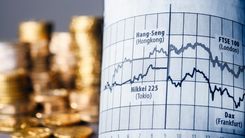Financial products traded on margin carry high degree of risk to your capital. Spread bets, CFDs and Forex are complex high risk instruments and therefore are not suited to all investors. CFDs are complex instruments and come with a high risk of losing money rapidly due to leverage. 69% of retail investor accounts lose money when trading CFDs with this provider. You should consider whether you understand how CFDs work and whether you can afford to take the high risk of losing your money. FX, Spread Bets and CFDs are provided on an execution only basis; we do not provide any advice nor should any communication with us, either written or oral, be construed as such.
web-qa.staging.markets.com/uk/ is operated by Finalto Financial Services Limited (FFS), which is authorised and regulated by the Financial Conduct Authority (FCA), registration number 481853. Finalto Financial Services is incorporated in England and Wales under company number 06557752 and whose registered address is at 11th Floor Broadgate Tower, 20 Primrose Street, London, England, EC2A 2EW. Finalto Financial Services is registered for VAT in the UK. Our VAT Registration Number is 991 2210 32.
FFS is a subsidiary of Finalto Group Limited.
The information on this website is not directed at residents of the United States, Japan, Canada, Belgium or any other country outside of the UK where such distribution or use might be contrary to local laws and regulations.
For privacy and data protection related complaints please contact us at privacy@markets.com. Please read our PRIVACY POLICY STATEMENT for more information on handling of personal data.
Markets.com operates through the following subsidiaries:
Safecap Investments Limited, which is regulated by the Cyprus Securities and Exchange Commission (“CySEC”) under license no. 092/08. Safecap is incorporated in the Republic of Cyprus under company number ΗΕ186196.
Finalto (BVI) Ltd is authorised and regulated by the B.V.I Financial Services Commission (“FSC”) under the Securities and Investment Business Act, 2010, licence number SIBA/L/14/1067.
Finalto (Australia) Pty Ltd is an Australian based company (ACN 158 641 064) regulated by the Australian Securities and Investments Commission (“ASIC”) under license no.424008.
Finalto (South Africa) Pty Ltd is regulated by the Financial Sector Conduct Authority (“FSCA”) under license no. 46860 and licensed to operate as an Over-the-Counter Derivatives Provider (“ODP”) in terms of the Financial Markets Act no.19 of 2012.
Finalto International Limited is registered in the Saint Vincent and The Grenadines (“SVG”) under the revised Laws of Saint Vincent and The Grenadines 2009, with registration number 27030 BC 2023.











